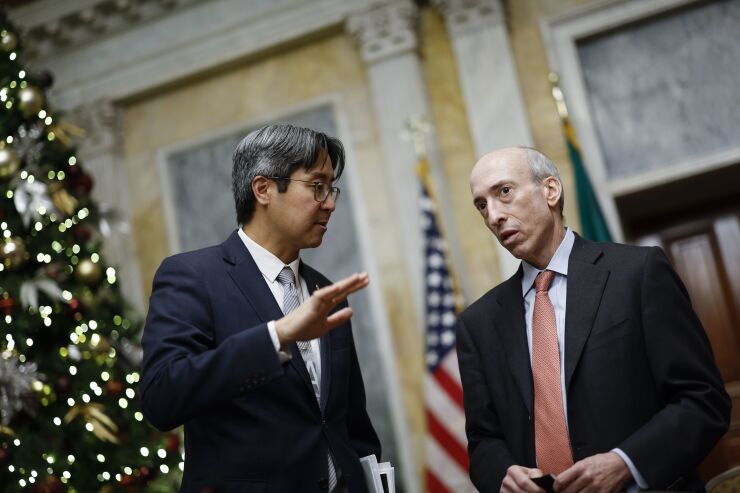
WASHINGTON — A rare clash between President Biden's financial regulators is unfolding over custody banking.
In correspondence with Rep. Andy Barr, R-Ky., Federal Reserve Chair Jerome Powell and acting Comptroller of the Currency Michael Hsu expressed misgivings about the Securities and Exchange Commission's proposed changes to its safeguarding rule — changes that would significantly broaden the rule's scope. Critics say that it would, at minimum, upend custody banking.
Neither regulator described a close rule-making relationship with the SEC on this proposal, although they both said it would affect banks.
"The fact that the prudential regulators have confirmed that the SEC did not consult with them is alarming enough," Barr said in an interview. "But the fact that they don't agree, that they have concerns with what the SEC is doing is I think even more troubling. That's what we haven't seen before."
Powell said in a
The pushback from the banking regulators is unusual, since regulators rarely criticize other regulators within the same administration.
Barr, the chairman of the House Financial Services Committee's financial institutions subcommittee, is one of the most vocal critics in Congress of the SEC's Gary Gensler, often railing against his actions at the agency in hearings, and criticizing the policymaker in public missives. On this occasion, however, several Democratic lawmakers on the House Financial Services Committee joined Barr in his November letter.
In an interview, Barr said that the comments from Hsu and Powell are "more evidence that the Gensler SEC has gone rogue and needs to be reined in."
"They need to start listening to the other regulators, not just Congress, which, of course, we have oversight responsibility, but also they need to start listening to other executive branch regulators, because they're working at cross purposes," Barr said.
The original letter from Barr's office was also sent to the Federal Deposit Insurance Corp., in addition to the Fed and the OCC.
The conflict centers on the proposal's requirement that qualified custodians, such as banks, segregate clients' cash in an account designed to protect the assets from the bank's creditors in the event of failure. The proposal is a reaction to the rapid growth of the cryptocurrency and stablecoin industries, as well as questions about the cryptocurrency exchange FTX's handling of money that backed digital assets before it collapsed.
"As you know, banks today generally do not segregate client cash or establish 'special accounts' to hold client cash deposits," the lawmakers said in the Nov. 1 letter to regulators. "Deposits are an unsecured liability of the bank. Depositors have historically been protected by an extensive prudential regulatory and supervisory framework."
OCC's Hsu said that this approach would be a departure for banks, many of which already have robust custody businesses, in how bank custodians hold clients' cash.
Hsu said that typically a bank custodian would hold client funds in deposit accounts at the bank, and those funds become unsecured deposit liabilities.
"This enables the bank to make these funds available for various purposes, such as extending intraday credit to clients and settling their securities transactions," Hsu said. "Requiring bank custodians to segregate cash could limit funds available to meet client needs."
Another aspect of the rule — imposing strict standards of care requirements on all custody agreements across the board — could also undercut banks' ability to custody assets, he said.
Those requirements, Hsu said, would mandate liability beyond the custodian itself to third-party agents, and would mean bank custodians would have to take on additional risk, which could spur banks to cut back on custody offerings.
Going forward, the concerns brought by the banking regulators could hold weight with the SEC's Gensler. The SEC still needs to finalize the rule, and has a host of different options to incorporate feedback from regulators or the public.
"I think it's a big deal that they would come out publicly and say that, because they could have just as easily kept quiet and told them their concerns privately," said Bryan Bashur, director of financial policy at Americans for Tax Reform. "I do think that would have an effect on the final rule to amend it. I don't know specifically what would be amended, but I would think that would have a material impact on the final rule."
Hsu said that the OCC has "informally" shared these "and other" concerns with the SEC, but that the agency hasn't shared any written comments on the proposal.
Powell said that the Fed "has been in contact with the SEC regarding the proposed rule to share our views and technical knowledge."
"Ultimate rulemaking authority under the federal securities laws, however, rests with the SEC," Powell said.






